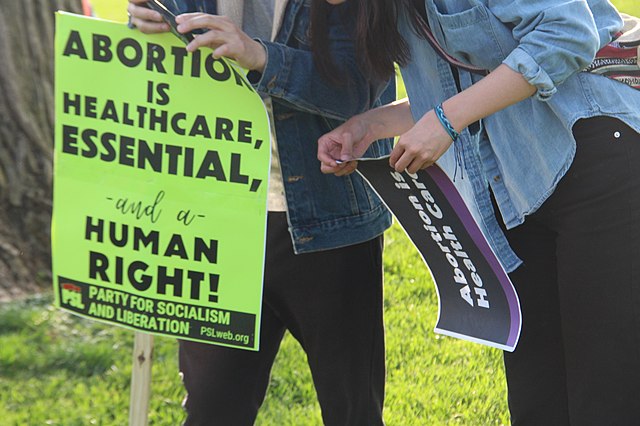Gemma Spinks
European leaders are voicing their outrage at the recent repeal of Roe v. Wade in the USA. Yet they are ignoring what is happening within their own Union, with some member states restricting access to abortion in recent years. Can the EU make up its mind when it comes to the protection of reproductive rights?
Members of the European Parliament have voiced their outrage about the U.S Supreme Court decision stripping the legal right to obtain an abortion. If this is welcome, the European Parliament should also look more closely at its own back garden.
A return to conservative views can be seen across Europe. Within the European Union (EU), right wing populist political parties have risen to power over the past decade. While many European nations are majority Christian, Conservative catholic interpretations in particular regard abortion as no less than murder. Several right-wing populist leaders have espoused such traditionalist conservative views and promoted restrictive legislation on abortion. This can be seen in Hungary where the nationalist Fidesz party, first elected to power in 2010 under the leadership of Viktor Orban, won a sweeping 49% of votes in the 2018 elections. Under the leadership of Orban, legislation has been adopted that tightens access to abortion. Likewise, in Poland, the conservative Law & Justice government, in power since 2015, has promoted conservative views and restrictive legislation on abortion.
A threat to reproductive rights at the core of Europe
These conservative governments feel threatened by the EU’s proclamations of its progressive and tolerant values. The European Union was founded on a set of aims and values which are inscribed in the Charter of Fundamental Rights of the European Union. A core value is human dignity: “it is inviolable. It must be respected, protected, and constitutes the real basis of fundamental rights”. Within the EU Charter of Fundamental Rights, Article 9, states “the right to found a family shall be guaranteed”, which implies the right to not found a family as well. It follows that people should be allowed the choice to decide whether to keep a child or not.Although, abortion isn’t directly mentioned in the EU Charter of Fundamental Rights, it is a widely recognised human right, and many EU members guarantee this right in national legislation.
Yet, in recent years Poland, a member of the EU since 2004, has severely restricted access to abortion. In 2020 Poland issued a near-total ban on abortion, ruling that abortions due to “foetal defects” are unconstitutional. This means that abortion will only be allowed in cases of rape, incest or a threat to life, which makes up only about “2% of legal terminations conducted in recent years”. In Hungary, where abortion laws had not been changed since 1992, in September 2022 a new regulation was introduced that specifies that people seeking an abortion will have to “listen to the foetal heartbeat” before being allowed to proceed, since many Hungarians associate the beginning of life with the first heartbeat.
Restrictive abortion legislation is not a specificity of central European member states. In Malta abortion is completely illegal, even if the life of the patient seeking abortion is in danger. It is the only EU country with a total ban on abortion and those who seek one can serve up to three years in prison. However, in 2022 the government proposed a law to allow abortions if a “mother’s life or health is at risk”. Yet despite this, the new law doesn’t include the right to an abortion for any other reason, like cases of rape, incest, or foetal defects. Furthermore, this law has only been proposed and the parliament vote hasn’t occurred yet, so the outcome remains uncertain. To make matters worse, President George Vella of Malta has said that he is “prepared to resign if parliament approves the amendment to the abortion law”, and for the bill to become law it needs to be signed by the President.
What is to be done?
There is an urgent need for an enquiry looking at reproductive rights within EU member states. Currently, in the Charter of Fundamental Rights of the European Union, there is no article that mentions reproductive rights directly. This should be addressed through the inclusion of the right to legal and safe abortions, free or at least at a reasonable price.
Additionally, the EU could guarantee access to free birth control at the age of 16 to 25, as facilitated access to birth control would mean less abortions are required in the first place. Currently, in the EU only “13 of the 27 EU member states reimburse contraception in their national insurance plan, which means that women from over half of the EU have to pay for their birth control either out of pocket or through private insurance”. France has recently agreed to make contraception free for women aged between 18 and 25, and so has Ireland for the age group 17-25. Extending this right to all EU citizens would significantly improve reproductive rights across the Union.
Furthermore, the EU could better enforce its own values and legislation across the Union. The EU’s response to the anti-LGBTQ laws in Poland and Hungary is a good example to follow, and the same response could be used to protect reproductive rights within the EU. In 2020 the European Commission issued a warning to Poland and Hungry: “give no respect, get no money”. Six towns in Poland were denied EU funding as a result of declaring themselves LGBT-free zones. Following this decision, the European Parliament approved a new rule called the “rule of law conditionality”, according to which EU budget payments to countries who do not respect EU law and values can be either suspended or cut . The aim is that countries will be compelled to respect EU laws and values, as loosing funding would be devastating to their governments.
Currently, there is no mechanism to expel a member state from the EU. If it were possible for states to be expelled due to breaches of EU law, then states like Poland and Hungary might be more likely to comply with EU laws and values. If the EU was at least ready to scold and take forceful action against its own member states for breaching shared values – as they have for the US’ repeal of Roe vs Wade – then reproductive rights would be better protected.
Gemma Spinks is a second year International Relations student at UEA who whilst studying the module ‘Introduction to the European Union’ noticed the lack of research around reproductive rights within the EU and wanted to bring awareness to this topic that is so relevant around the world.





